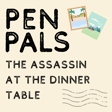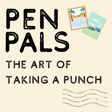
The Imposter's Guide to Writing Anyway
In this episode of Pen Pals, Krisserin and Kelton confront the demons of self-doubt that haunt their writing lives. Between morning pages and late-night edits, they unpack their deepest insecurities: Krisserin fears her technically-sound writing lacks soul, while Kelton wonders if she knows how to craft a novel at all. They swap strategies for silencing the critics – both external and internal – from reading work aloud to find its rhythm, to using other art as a 'pulley system' to escape creative ditches. Through tales of childhood competitive classmates and bosses who demanded humility after success, they recognize how much of their imposter syndrome comes from voices outside themselves. With their new approach of assigning each other goals, Krisserin commits to editing two specific chapters while maintaining her 5AM writing routine, and Kelton agrees to brain-dump her novel's treatment before tackling 1,500 new words. As they navigate their writing journeys, they discover that sometimes the most difficult character to write convincingly is the one who believes in herself.
Get in contact with us at: officialpenpalspod@gmail.com
Music by Golden Hour Oasis Studios



